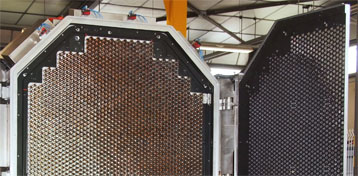A new camera for exploring the violent Universe
HESS, one of the world's best-performing ground-based gamma ray detectors, will soon boast a fifth telescope that will double its potential for making new discoveries. The telescope will be equipped with
 |
| Upper part of the camera (picture from CNRS website) |
In order to increase the instrument's sensitivity and reveal some of the mysteries of our Universe, the researchers involved in HESS are developing an even more efficient device, known as HESS-II, which consists in adding a very large central telescope of 28 m in diameter to the existing system. The 596 m2 of this telescope's mirror (compared to 107 m2 for each of the 4 telescopes already in place) will concentrate the light on a camera that has just been built. With a sensitive surface area of 2.15 m in diameter and a granularity(7) twice that of the cameras used at present, it will be able to detect gamma photons one by one with a response time on the nanosecond (10-9 s) scale. This camera is a real eagle's eye and the key component of the fifth telescope. It represents France's main contribution, with IN2P3/CNRS as project manager. The French laboratories, backed up by a network of industrial partners, built on the expertise acquired in developing cameras for the first four telescopes. The new camera still needs to undergo calibration tests before being shipped to Namibia and installed on the fifth telescope, which is expected to be fully operational by 2011.
HESS-II, which is more sensitive and covers a broader energy range, will pave the way for new discoveries and will make it possible to expand the catalogue of high-energy sources in the Universe. More specifically, this new network should help to increase the number of known sources emitting high-energy gamma rays and significantly improve images of celestial objects, such as the remains of supernovae.
Source: CNRS Website